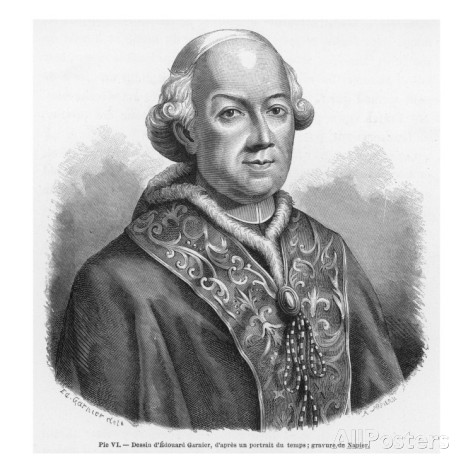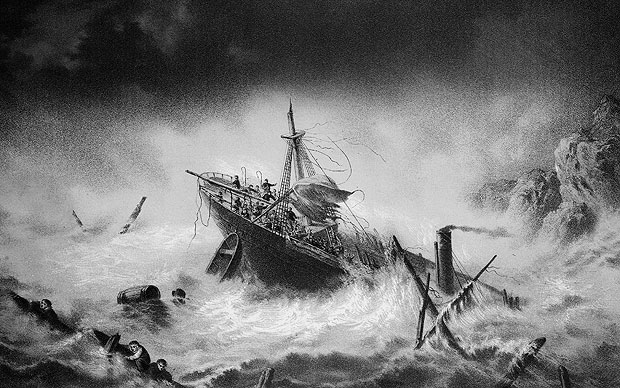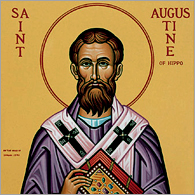[Y]ou do not realize you are committed to the inexorable self-refuting argument that after 1634 popes have been deceptive because they have no longer spoken against this doctrine despite the fact that it was constantly acquiring more and more embellishments from supporters and was becoming universally held. . . . [T]his smells a little of the doctrine that some truths are being obscured in the Church, especially on the part of the Holy Apostolic See; and this doctrine is indeed heretical and was condemned as such in the bull Auctorem Fidei, . . . So you are in the position of judging yourself by your own principles.” (Fr. Benedetto Olivieri, Commissary General of the Holy Office, 1820; cited in M. Finocchiaro, Retrying Galileo, 214f.)
“Obscuring of Truths in the Church . . . The proposition, which asserts ‘that in these later times there has been spread a general obscuring of the more important truths pertaining to religion, which are the basis of faith and of the moral teachings of Jesus Christ,’ — heretical.” (Pope Pius VI, Auctorem Fidei, proposition 1)
I pray that in these latter days people like me, Cassini, Sungenis, Salza will be the ones from which resurgence is born and our bishops are brought to task to restore Sacred Tradition (geocentrist “excubitor”, on the Catholic Answers Forum).
The new geocentrists claim that geocentrism was clearly held as a doctrine of faith in the first fifteen centuries of the Church and that any and all non-geocentric views were just as clearly condemned as “formal heresy” by the Catholic Church in the seventeenth century. Please carefully consider the implications of that claim.
They are saying that, for centuries, all the popes and all of the bishops in communion with them have been at least complicit in allowing and even promoting the spread of this supposed heresy and that most or all have been at least material heretics themselves. Official, magisterial acts of the Church have actively promoted the spread of this supposed “formal heresy”, even though the Church herself solemnly declares that she has “by divine appointment the right and duty of condemning what wrongly passes for knowledge” (see “Geocentrism and the First Vatican Council”).
The new geocentrists go to great lengths to play up the supposed importance of geocentrism. As we’ve seen in Parts 1 and 2 of this series, they insist that its denial is a cancer that will gut the entire Christian message. They insist that it’s through weakness, malfeasance, and cowardice that the Magisterium of the Church has ceased for centuries to teach one of her solemn doctrines.
The problem is that their premises are completely wrong—geocentrism has never been officially taught as a matter of faith by the Catholic Church, so Catholics violate no doctrine or dogma of the Church if they hold to the motion of the Earth. But ironically, by playing up the supposed importance of geocentrism, the new geocentrists are running headlong into a violation of a real dogma of our Faith, namely, the indefectibility of the Church.
“Judging Yourself By Your Own Principles”

www.britannica.com
This was first pointed out to Fr. Filippo Anfossi, the Master of the Sacred Palace during the reign of Pope Pius VII, by the Commissary General of the Holy Office, Fr. Benedetto Olivieri. If you read the exchange between the two men, Fr. Anfossi sounds remarkably like Sungenis and it can hardly be an accident that Sungenis has dedicated the third volume of Galileo Was Wrong to Fr. Anfossi.
One striking indication that Fr. Anfossi had gotten hold of the wrong end of the stick is that in 1820 the Commissary General of the Holy Office pointed out to Fr. Anfossi that his stance on the matter actually put him on a collision course with a heresy, namely, that the entire Magisterium of the Church can obscure the important truths of the faith. Here is the Commissary General’s pointed comment:
[Y]ou claim that the condemnation [against Galileo] was a solemn judgment; that it originated from the pope himself and the Holy See; that it was an unrevisable judgment; that it declared a doctrine “heretical or at least erroneous in the Faith”; and that it targeted the doctrine of the earth’s motion as it is taught even today. Then you do not realize you are committed to the inexorable self-refuting argument that after 1634 popes have been deceptive because they have no longer spoken against this doctrine despite the fact that it was constantly acquiring more and more embellishments from supporters and was becoming universally held. Finally, . . . you come along and tell us that “for reasons known to them” they have neglected to acknowledge the truth of the faith. But, Most Rev. Father, this smells a little of the doctrine that some truths are being obscured in the Church, especially on the part of the Holy Apostolic See; and this doctrine is indeed heretical and was condemned as such in the bull Auctorem Fidei, in the first proposition, if I am not mistaken. You know that, for you have defended this bull. So you are in the position of judging yourself by your own principles. (Finocchiaro, Retrying Galileo, 214-15; my emphasis).
This insightful analysis by Fr. Olivieri applies all the more to the modern geocentrists. In Galileo Was Wrong, Sungenis casts the allowance and adoption of non-geocentric views as the foundation of a great apostasy from the faith, which affects not just individuals but the Magisterium of the Catholic Church itself:
[T]he people have been led astray by false teachings. . . . These examples, however, are not to say that those who do not believe in geocentrism are either no longer individually faithful to the Catholic Church or that they are an integral part of the apostasy. The masses cannot be blamed for what they have been taught by their authorities . . . one of the signs of the general apostasy predicted by Holy Scripture will be a general and pervasive turning away from the previously accepted truths of Scripture and Tradition. The mass rejection of geocentrism is just one sign of that eventuality” (Galileo Was Wrong, 9th ed. vol. 3, pp. 448f.; emphasis mine).
Sungenis’s friend “John Martin” had this to say, “I believe the church silence on the matter of geo in the last 300 years is easily accounted for through either inept leadership or fear of the science establishment” (link).
For “cassini”, the matter of geocentrism versus other cosmologies is overarching and all-consuming: “I have stated that the heliocentric heresy is Lucifer’s greatest lie because once it enters the mind it is impossible to get free from” (link) and, “This is Satan’s greatest heresy. He has them all fooled and has Catholics defending his lie…” (link).
Geocentrist “excubitor”, who also is still very active in advancing geocentrism online, sees geocentrism as the very source for all the Church’s ills: “The church hangs by a thread. Disbelief in almost every article of the faith is rampant. And where did it all begin? It began when the rank and file abandoned their teachers to follow the rank and vile teaching of heliocentrism, which paved the way to question every element of the faith . . . ” (link).
(See additional examples in Part 2 of this series.)
This new geocentric “theology” has a serious problem. While the Church does teach that there will in the last days be a “great apostasy”, a large scale falling away from the true faith, the Church does not teach that the Magisterium itself will cease to teach the truths of the Catholic faith.
This bears repeating: The Catholic Church does not teach that the Magisterium itself will cease to teach the truths of the Catholic Church during the “Great Apostasy”.
In fact, the Magisterium teaches just the opposite. Let’s look again at the proposition condemned as heretical by Pope Pius VI. The proposition was in response to the acts of the Gallican/Jansenist Synod of Pistoia which declared in its first decree Decretum de fide et ecclesia that a variety of official actions by the Catholic Church had served to distort and confuse various fundamental doctrines and moral teachings (see Synod of Pistoia). In 1794, Pope Pius VI issued the following statement:
A number of traditional theologians directly link this formal decree with the dogma of the indefectibility of the Church. Here is the noted Fr. Reginald Garrigou-Lagrange:
The Church cannot neglect truth; nor can it impugn truth. Neither can it tolerate the obscuring of the graver truths of faith and morals. It is equally impossible for the Church to inaugurate injurious discipline (The Theological Virtues: On Faith, p. 211).
Bishop Vincent Gasser stated in his official Relatio on papal infallibility at the First Vatican Council that it is not possible for “important truths, which touch on religion” to fall into “general obscurity” among the popes and bishops in communion with them:
Indeed, since we believe that the Pope is infallible through the divine assistance, by that very fact we also believe that the assent of the Church will not be lacking to his definitions since it is not able to happen that the body of bishops be separated from its head and since the Church Universal is not able to fail. For, it is impossible that general obscurity be spread in respect to the more important truths, which touch upon religion, as the Synod of Pistoia held. (Bishop V. F. Gasser in his official Relatio at the First Vatican Council, cited in The Gift of Infallibility; link).
And theologian Romano Amerio states, the notion that the official teaching of the Church can be obscured is “contrary to the nature of the Church”:
As generally happens in calls for reform, the Pistoians alleged that there had been a general obscuring of important religious truths in the Church in recent centuries (Proposition 1). This allegation was contrary to the nature of the Church, for in her, truth is indefectible and can never be obscured in her official teaching (Romano Amerio, Iota Unum, p. 31.)
Compare this authentic Catholic theology with the position staked out by the new geocentrists. They insist that the denial of geocentrism is the very root of all the Church’s and society’s ills. They argue that it is the veritable source of all modern errors. They argue that it is the fountainhead of moral and philosophical relativism. But the more they play up the importance of geocentrism, the more they run headlong into a violation of the dogma of the indefectibility of the Church and more specifically into the heresy denounced in Auctorem Fidei: “that in these later times there has been spread a general obscuring of the more important truths pertaining to religion, which are the basis of faith and of the moral teachings of Jesus Christ”. Their own position is, on the face of it, condemned as heresy.
Interpreting the Church’s Decrees Strictly….When It’s Convenient
Now, of course the new geocentrists are going to try to wriggle out of this charge. How will they do so? I predict that they will seek to interpret the first proposition of Auctorem Fidei strictly. That is, they will find ways to interpret it as narrowly and as affecting as few people as possible. Specifically, they will seek to interpret it so strictly that it does not apply to them.
This is the very thing they refuse to do when examining the seventeenth-century decrees of the Congregations of the Index and Holy Office touching on Copernicanism. They will want to interpret Auctorem Fidei strictly, so as not to fall under its strictures themselves, but they insist on interpreting the seventeenth-century decrees as broadly as possible, directly contrary to the Church’s own canonical norms.
The great irony here is that it is precisely on the basis of strict canonical interpretation that we find that those decrees address only a strict heliocentrism and thus technically do not apply to more modern cosmological views. It is on the basis of the Church’s own perennial norms of canonical interpretation that those seventeenth-century decrees may be seen as ecclesiastical dead letters, applying to no one since the view they address is no longer held (see “Geocentrism and Strict Canonical Interpretation”.)
Hiding Behind the Feeneyites
Traditionalist commentator Chris Ferrara has tried a different tack, making a comparison between the geocentrists and the rigorist position taken by the Feeneyites with regard to “no salvation outside the Church.” Ferrara argued that, “the regularized Feeneyites in MA are to be left unmolested in their rigorism, as the local bishop made clear upon inquiry of the Vatican. They have the right to their rigoristic view” (link).
They have the right not to be denounced as non-Catholics on account of the rigorist view. But they do not have a right not to be opposed for their mistaken rigorism.
The Feeneyites and the new geocentrists have this fundamental point in common—they both argue that the Magisterium of the Church has been derelict in its duty to uphold the “True Faith”, as they see it. And they both, if they press their case hard enough, run right onto the shoals of the condemned proposition of Auctorem Fidei. Their exercise of private judgment in defense of their rigorous stance runs them into a serious theological error that has been formally condemned as a heresy.
Ferrara’s appeal to pastoral tolerance in this instance is puzzling when one considers the numerous times he has denounced such pastoral tolerance as dangerous laxity in other contexts. And the notion that the Feeneyites have “the right to their view” rings strange from a man who in most other contexts would strenuously contend that error has no rights.
Ferrara’s comparison also fails because there are fundamental differences between the two situations. The Feeneyites insist on a rigorist interpretation of what both sides agree is an actual dogma of the Church. Neither side disputes that the Church teaches “no salvation outside the Church” as a dogma. But this is precisely the point in contention with the geocentrists. By the use of principles that violate the Church’s own perennial rules of canonical interpretation, the geocentrists erroneously insist that geocentrism is and remains the official teaching of the Church. The Magisterium just as clearly indicates that it’s not (see “The Magisterium Rules: The Debate is Over” and “Geocentrism and the First Vatican Council”).
All the more interesting is that the rigorist position of the Feeneyites has been strongly criticized even from within the traditionalist camp. Frs. Francois Laisney and Jean-Marc Rulleau of the Society of Pius X (SSPX) have written book-length rebuttals and a number of articles on the topic appear on the SSPX website. Fr. Laisney insists that Catholics are not free to hold a rigorous position in defiance of magisterial teachings – he states, “this issue . . . is not at all one open to free choice” and “Rigorism always tends to destroy the truth” (link). Fr. Peter Scott, district superior of the SSPX in the U.S. is even more emphatic: “The Feeneyite error is consequently a very grave one”. He describes it as “ultra-rigid and super-strict” is critical of “the substitution of private opinion for the Church’s teaching that is typical of liberalism, but also in a narrow-minded legalism” and denounces “The total fascination that some of these Feeneyites have with ‘the dogma’”.
The SSPX takes the rigorist error of the Feeneyites and their “constant effort to proselytize for their opinion” seriously enough that “the Society of St. Pius X does not allow any proselytism of this error in or around its chapels and faithful, either by word of mouth or by written handouts” (link).
The parallels to the new geocentrism are obvious. As I have documented in this article, the new geocentrists also trouble the Catholic faithful in their “constant effort to proselytize for their opinion” and their “substitution of private opinion for the Church’s teaching”. If the Feeneyites and geocentrists have a “right” to express their rigorist view, we have in turn every right to point out the logical consequences of their rigorism and the collision with the Church’s teaching in Auctorem Fidei. It is therefore perfectly legitimate to oppose both their position and their attempt to mislead the faithful.
Follow the Catholic Church or the Geocentrists
The new geocentrists have boxed themselves in. Or, to use the analogy I have used before, they’re like a monkey who has shoved his hand into a priceless Ming vase in order to grab a pebble. The priceless vase is the Catholic Faith. The pebble is geocentrism. They think that the pebble is so very precious. They play up its importance at every turn. They consider it their God-dictated duty to spread the gospel of geocentrism. And they claim that it is the official teaching of the Catholic Church.
The solution to the whole problem, the way to get the hand out of the vase without destroying it is simply to see that the Catholic Church has never taught geocentrism as a matter of faith. The Fathers of the Church did not do so (see here, here, and here.) The Roman Catechism doesn’t do so (see here and here.) The seventeenth-century decrees on the issue, when interpreted strictly according to the Catholic Church’s own canonical norms don’t do so either (here).
If the geocentrists refuse to follow the Church’s Magisterium, if they refuse to acknowledge that the Catholic Church does not teach geocentrism as a matter of faith, then the only way to hang on to their “prize” is to smash the priceless vase, the Catholic Faith itself. As we’ve seen in Part 1 and Part 2 of this essay, that’s basically what they do.
The new geocentrists must decide. The only way they can maintain their supposed contradiction between the seventeenth-century decrees and the words and actions of Magisterium since that time is if they reject the Church’s norms of strict canonical interpretation. If they do that, they just as clearly have themselves fallen into a heresy formally defined in Auctorem Fidei by Pope Pius VI. Conversely, if they accept the Church’s own norms of strict canonical interpretation, they can free themselves from the heresy to which their position inevitably leads. These same principles eliminate the anomaly they insist exists between the seventeenth-century decrees and later magisterial acts that give freedom to Catholics to hold non-geocentric views. In short, they must abandon their insistence that geocentrism has been and remains official Church teaching, or else fall into heresy themselves.
Yet again the choice comes down to this stark question: Who are you going to follow, the Catholic Church or the new geocentrists? It’s one or the other.





